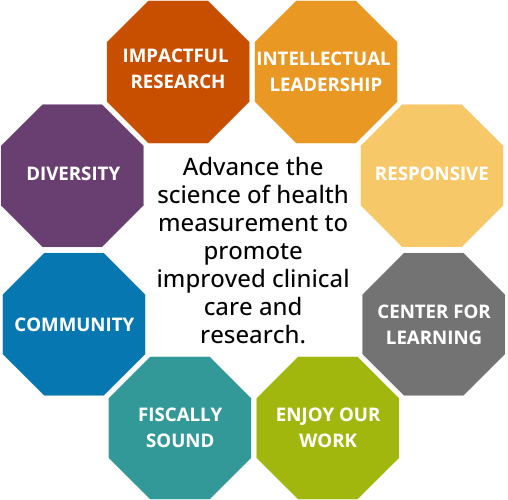
Center for Health Measurement (CHM) in Research
Our goal is to improve the care and quality of life by assessing the perspectives of patients, caregivers, and clinicians.
About Us
The Department of Population Health Science’s Center for Health Measurement engages patients and caregivers, learns about their preferences and experiences, and works with clinical partners to improve health outcomes. Our multi-disciplinary research teams conduct innovative patient-centered outcomes research to bring the voices of the patients and caregivers more directly into care planning, treatment decisions, and health policy.
Our research teams focus on:
- Identifying Outcomes that Matter to People – engaging patients, patient advocates, caregivers, providers, payers, and regulators to determine the set of outcome measures that will best answer questions of interest.
- Developing Clinical Outcomes Assessments – using mixed methods to design and evaluate measures of patient-reported outcomes (PROs), clinician-reported outcomes (ClinROs), performance outcomes (PerfOs), and observer-reported outcomes (ObsROs) for use in clinical research and healthcare delivery settings.
- Assessing Patient and Caregiver Preferences - designing and applying stated-preference methods to capture patients’ and caregivers’ concerns, values, and preferences in regulatory, coverage, and treatment decisions.
- Innovating Methods for Developing and Evaluating Health Measures – conducting qualitative and quantitative methodological studies that lead to improvements in the way health measurement research is conducted.
Methodological Expertise
We accomplish these objectives using a variety of qualitative and quantitative methods, including:
- In-Depth Qualitative Interviews
- Cognitive Testing
- Psychometrics
- Latent Variable Modeling
- Quantitative Preference Elicitation Methods
How Our Research is Used
Our research is conducted with patients across the lifespan from pediatric to geriatric and involves many disease areas. Our measures have been used in clinical trials and in clinical care, as well as for population surveillance and quality improvement initiatives. Our growing Center continues to develop partnerships with patients, caregivers, clinicians, and researchers in a wide range of disciplines, as well as across academia, industry, and government.
What Makes CHM Unique?
CHM sits within the Department of Population Health Sciences within the Duke University School of Medicine. We have expertise in qualitative and quantitative health measurement methods and conduct research across the lifespan from pediatric to geriatric. Our research funding comes from the NIH, FDA, private foundations, and industry. We lead our own health measurement projects and collaborate with other faculty to support their health measurement research. We provide graduate-level mentoring in health measurement.
Our Values
The Center for Health Measurement is dedicated to advancing the science of health measurement to promote improved clinical care and research. We value inclusion, impactful research, and intellectual leadership. We are responsive to public health needs and serve as a center for learning. We believe in enjoying our work and being fiscally sound. Above all, we are a community that supports one another and works collaboratively towards our goals.
